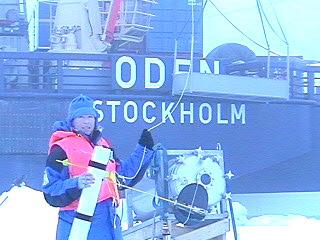
|
|
9 July, 2001
True Marginal Ice Zone Station
Monday, 9 July 2001
God dag! (Good day!)
Life on Board
Every few days, someone onboard gives a lecture in the evening after dinner
(Is it still called evening even though you know it will be light until the
next morning? In the Arctic summer, evening and morning are solely
determined by when we eat the food associated with the evening and morning
meal). So far, we have had lectures on some of the science of the
biogeochemical processes in the ocean and a talk about a 1980 Swedish
Arctic expedition. An artist gave tonight's lecture.
The Swedish Office of Polar Research always invites either an artist or a
musician along on their research expeditions. The Arctic is such a part of
their culture that they bring the chosen artist on the expedition to take
the experience back to Sweden in some form. Gerhard Rehm, a light
architect from Stockholm, joins us on the first leg of the expedition. He
owns a company that designs lighting systems for homes or businesses, and
lamps for home use. He wants to study the special light which occurs only
in the Arctic so that he can use it in his work in the future. He showed
us slides from projects he has worked on and told us some of the background
behind the designs, like how the lighting in an airport terminal is
different from the lighting in a concert hall. All in all, an entertaining
break from science.
Where Are We Now?
After icebreaking through thin ice plates all night, we arrived at Marginal
Ice Zone Station #3 at about 3 am with a position of 82o02' North/25o49'
East. The sea is calm, as always in the ice, but we are in thicker ice
here and it is quite foggy. The captain has anchored to a large ice sheet
and the crane will help people get down to the ice.
Scientists at Work
As soon as we arrive at a station, the sampling rosette is cast over the
aft (back) deck so the science groups can get their seawater samples right
away. That means that you have to get up at 4 am if your group needs
seawater from this station. Our group always needs seawater from the
station. Guess who always "gets" to help collect water samples?
Unfortunately for me, at our daily meetings, I always tell the big group to
let me know if anyone needs any help, and invariably someone says, "I could
use some help collecting water." What can I do?
Today, I got to go onto the ice for the first time. You really have to
dress warmly if you know that you will be out for several hours. You also
are required to have a radio for communication, and wear a bright flotation
device in case you fall into the water or the ice breaks under you. My
first job was polar bear spotter (PBS) for a group drilling ice cores. My
feet were getting cold just standing there so I started marching in place.
I guess it looked pretty funny since I was also holding a shotgun. From
the bridge (control room), all groups on the ice are constantly being
monitored, so, apparently they all thought it was pretty funny, too. When
I came back to the ship, everybody started making jokes and mimicking my
marching in place (good-natured, of course).
My second job was helping Mike Jensen, a meteorologist from Boulder,
Colorado, launch a large kite, which holds a detector for pressure,
temperature, and humidity. He made two flights, attempting to go up a
couple of kilometers on each. On the second one, the fog in the air caused
the kite line to become very wet and then it froze. The weight of the ice
on the line was apparently too much for the kite and it came crashing
down-on the other side of a very wide open lead (channel) in the ice. We
were unhappy about that but very happy that it didn't land IN the water.
We had to wait for the Zodiac boat to finish with the divers before we
could collect the kite (the line was all tangled up and sopping wet).
Vi ses! (See you later!)
From Deck 4 on the Icebreaker Oden, somewhere northeast of Spitzbergen,
Dena Rosenberger

Me with the kite detector
Contact the TEA in the field at
.
If you cannot connect through your browser, copy the
TEA's e-mail address in the "To:" line of
your favorite e-mail package.
|
